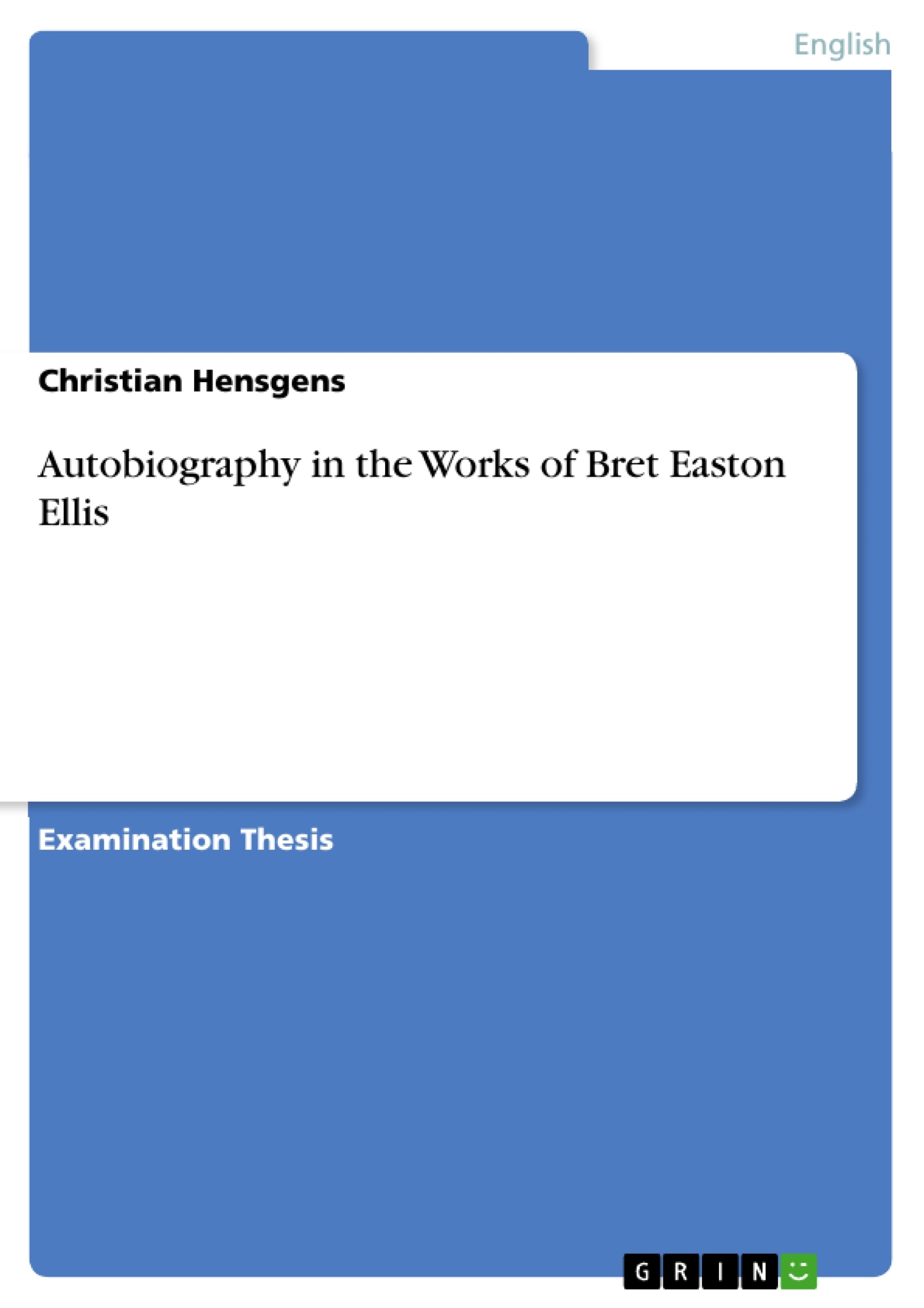Autobiographische Werke erfreuen sich zunehmender Beliebtheit. Nicht zuletzt unterstreichen ständig steigende Verkaufszahlen den Vormarsch von Autobiographien auf dem Buchsektor und legitimieren diese Textsorten immer deutlicher als eigenständige Gattung. Begriff und Umfang der "Autobiographie" sind dabei umstritten und seit jeher einem geschichtlichen Wandel unterworfen. Was macht eine Autobiographie aus? Was unterscheidet eine Autobiographie vom Roman, was von einer Biographie oder gar von Memoiren? Auf diese und andere Fragen der Begriffsbestimmung einer Autobiographie geht die vorliegende Arbeit ein. Sie gibt nicht nur einen Überblick über den geschichtlichen Wandel des Begriffes, sondern entwickelt außerdem einen Katalog konstituierender Merkmale einer Autobiographie. Anhand dieser Kriterien werden die Werke des US-Erfolgsautors Bret Easton Ellis untersucht und herausgearbeitet, ob und inwiefern sie als autobiographisch bezeichnet werden können. Im Mittelpunkt der Untersuchung steht dabei Ellis’ Werk „Lunar Park“, mit dem der Autor den Leser auf eine Reise zwischen Traum und Wirklichkeit schickt. Es ist eine Reise zwischen Autobiographie und Roman, die den Leser in vielfältiger Weise maßregelt und seine Leseerwartung dadurch nachhaltig beeinflussen wird.
This work examines autobiographical theories in their development over the last decades and gives an overview of predominant theoretical approaches until today. Against this background, a catalogue of constitutive conditions of autobiography is being created. In the following, the works of Bret Easton Ellis are examined for these autobiographical characteristics, especially his latest work "Lunar Park" will be in the center of this paper.
Inhaltsverzeichnis (Table of Contents)
- Introduction
- Life and Works of Bret Easton Ellis
- The Autobiography - Overview and Convergence
- Range and Dimension of Autobiography
- Definition, History, and Development of Autobiography
- Between Fact and Fiction: Solving the Problem of 'Truth' in Autobiographies
- Autobiography and the Question of Genre
- Distinction of Different (Auto)biographical Styles of Narration
- The Form of Autobiography and How It Is Reflected in the Works of Bret Easton Ellis
- About the (Auto)biographical Influence on Ellis's Works between 1985 and 2000
- The Aspect of Authenticity and Verifiability
- The Selection of Facts and the Form of Depiction
- Orientation towards the Reader and the Reader's Expectation
- The Aspect of Autobiographical Intention and Authorship
- Metanarrative Aspects
- Attempting a Categorization of Bret Easton Ellis's Works
- Range and Dimension of Autobiography
- Conclusion
Zielsetzung und Themenschwerpunkte (Objectives and Key Themes)
This academic paper explores the complex relationship between autobiography and fiction in the works of Bret Easton Ellis, focusing specifically on his later work "Lunar Park." It aims to investigate the convergence of autobiographical elements with fictional techniques in Ellis's writing, analyzing how he utilizes the subjective nature of autobiography to challenge conventional notions of genre and authorship.
- The definition, history, and development of autobiography
- The intersection of fact and fiction in autobiographical writing
- The role of genre and its influence on the interpretation of autobiographical works
- The impact of postmodern literary techniques on the understanding of autobiography
- The examination of "Lunar Park" as a case study for the convergence of autobiography and fiction in Ellis's work
Zusammenfassung der Kapitel (Chapter Summaries)
The introduction examines the rise of autobiography as a literary genre and its enduring popularity in the contemporary literary landscape. It explores the reasons behind the appeal of autobiographical texts, analyzing the motivations of both writers and readers.
Chapter two delves into the life and works of Bret Easton Ellis, exploring his writing career and providing context for his later works. The chapter analyzes his distinct style, themes, and influences, highlighting key aspects of his literary output that are relevant to the main topic of this paper.
Chapter three presents a comprehensive overview of the concept of autobiography, encompassing its definition, historical development, and theoretical frameworks. It explores the inherent tensions between fact and fiction in autobiographical writing, and the difficulties of discerning "truth" in such texts. The chapter also examines different styles of autobiographical narrative, including memoirs, diaries, autofiction, and autobiographical novels.
Chapter four examines the influence of autobiography on Ellis's works, particularly in the context of his later novels. It analyzes the degree to which his writing reflects elements of his personal life and experiences, considering factors such as authenticity, verifiability, and the selection of facts.
Schlüsselwörter (Keywords)
The core themes and keywords of this work include autobiography, fiction, genre, postmodernism, Bret Easton Ellis, "Lunar Park," narrative, authorship, and the convergence of fact and fiction. The research explores the interplay of these concepts in Ellis's works, particularly his use of autobiographical elements and his challenge to traditional notions of genre and authorship.
- Quote paper
- Christian Hensgens (Author), 2006, Autobiography in the Works of Bret Easton Ellis, Munich, GRIN Verlag, https://www.hausarbeiten.de/document/63741


